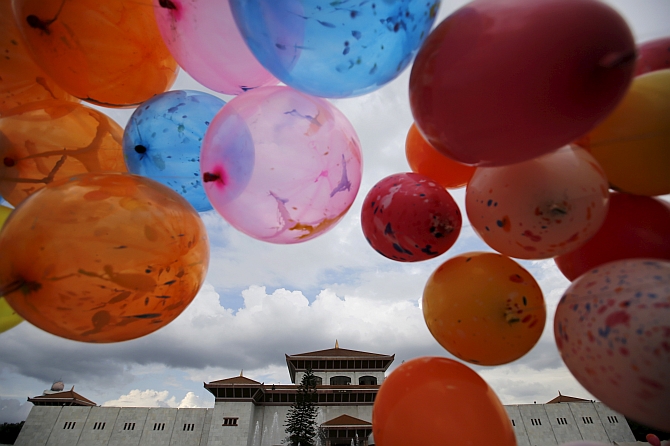Nepal Finally Has A Constitution, India Unhappy
Celebrations In Nepal

NEW DELHI: Nearly a decade after ending a long running civil war, Nepal has formally adopted a new constitution. President Ram Baran Yadav signed the document in Kathmandu on Sunday. The new constitution defines the majority Hindu nation as a secular republic divided into seven federal provinces. It has been met with protests since it was agreed to by parliament last week, with police firing on protesters in the country’s South on Sunday.
At least 40 people have been killed amid protests by the Madhesi and Tharu ethnic groups in the south in recent weeks. On Sunday, clashes broke out between security forces and a crowd of Madhesi protesters who had defied a curfew to demonstrate in the town of Birgunj, Parsa district. One person was killed and several injured.
The Madhesi and Tharu people are concerned that the new charter -- raised by the Maoists after the end of the civil war in 2006 -- will bring changes to the border and election rules that will further marginalise these communities.
Related to the above is the response of India, which released a statement that referred to the new constitution as “a” constitution, not “the” constitution. A statement from the Ministry of External Affairs stated that India is “concerned that the situation in several parts of the country bordering India continues to be violent.” “We urge that issues on which there are differences should be resolved through dialogue in an atmosphere free from violence and intimidation, and institutionalised in a manner that would enable broad-based ownership and acceptance,” it added.
India’s ambassador Ranjit Rae telephoned Nepal’s Prime Minister Sushil Koirala hours before the promulgation ceremony, reiterating India’s disappointment to the constitution in its current form.
On Friday, Prime Minister Narendra Modi had sent Foreign Secretary S Jaishankar to Kathmandu with an appeal. “India has been strongly supportive of constitution making in Nepal. We would like its completion to be an occasion for joy and satisfaction, not agitation and violence. We hope that Nepal's political leaders will display the necessary flexibility and maturity at this crucial time to ensure a durable and resilient Constitution that has broad-based acceptance,” a statement following the visit said.
Sources indicate that Nepal’s refusal to extend the date for adopting the constitution has come as a major blow.
So why is India so peeved?
The Madhesi and Tharu people live along the India-Nepal border, in the Tarai region that borders India’s Bihar. India echoes these ethnic communities’ belief that the constitution is not inclusive. One, the federal-provincial demarcation is unfair to the people of the Tarai region; two, constituency delimitation is in favour of the Pahadi community, who get hundred seats whereas the other half of the population -- consisting of the Madhesi and Janjatis -- get only 65 seats; and three, the proportional inclusion clause includes reservation for several forward casted of the Pahadi region.
India, which exerts some influence in the Tarai region, maintains that unrest in the region can spill over into India -- a reasoning offered for its strong stance against the new constitution



